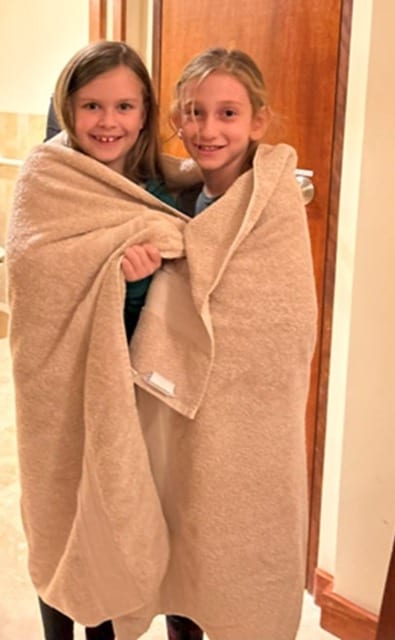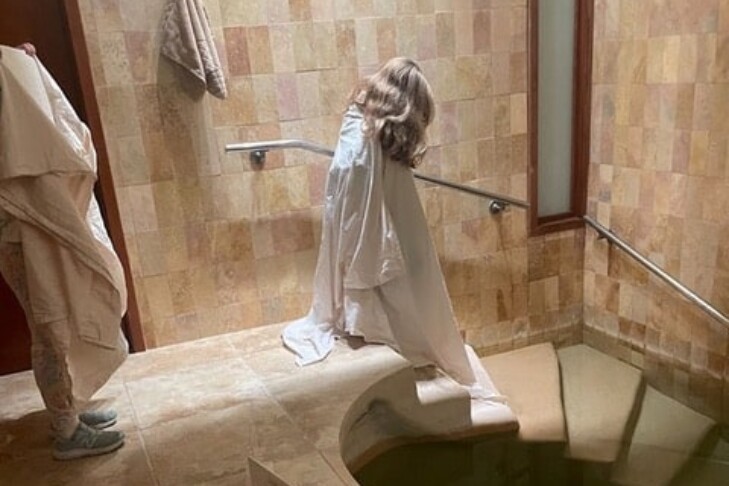A win-win: Kesher Newton, a Hebrew immersion after-school program, and Mayyim Hayyim, Boston’s community mikveh, joined forces to support people with disabilities at the mikveh. Through Kesher’s project-based learning model, kindergartners through eighth graders created “social stories” for mikveh guests to make their immersion experiences more accessible. The books are available to all guests and volunteers.
Social stories use pictures and simple sentences to explain a new experience to someone with cognitive disabilities or sensory impairments; they’re also helpful for people without disabilities, especially kids. They answer questions kids tend to ask: What will I see? How does it smell? What can I do? What should I avoid?
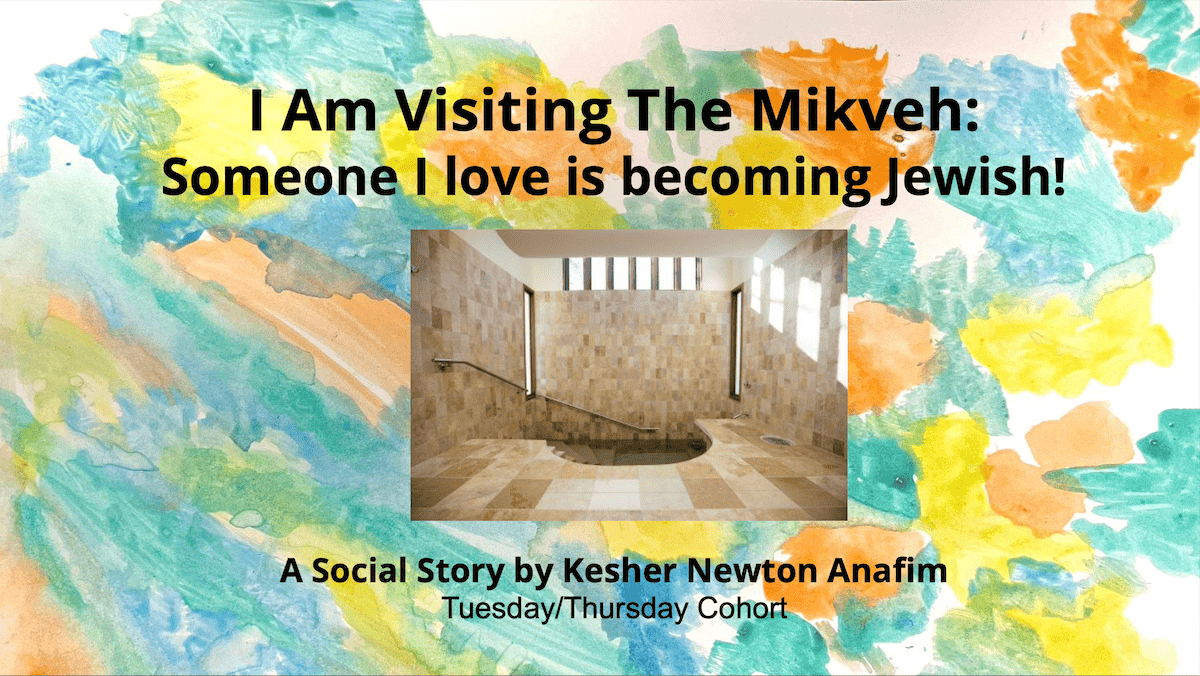
Kesher has a long tradition of project-based learning, from students exploring Jewish farming by creating signage for the Gann Academy Community Farm to crafting commemorative stamps for Israel’s 75th birthday.
Their 65 students come from every stream of Judaism. They visit two afternoons a week for modern Hebrew language instruction and Judaic learning. (You might have seen their Israeli dance troupe performing at the Israel Folkdance Festival of Boston and at Red Sox games.) One of Kesher’s tenets is also inclusion and belonging. Teachers are trained in Universal Design for Learning (UDL) and techniques for reaching different types of learners, so this project was a perfect fit.
Meanwhile, Mayyim Hayyim’s mission is to reclaim and reinvent one of Judaism’s most ancient rituals, immersion in the mikveh, for contemporary spiritual use; to teach about it for all who are interested; and to make the mikveh a sacred space that is open and accessible to all Jews (and those who are becoming Jews).
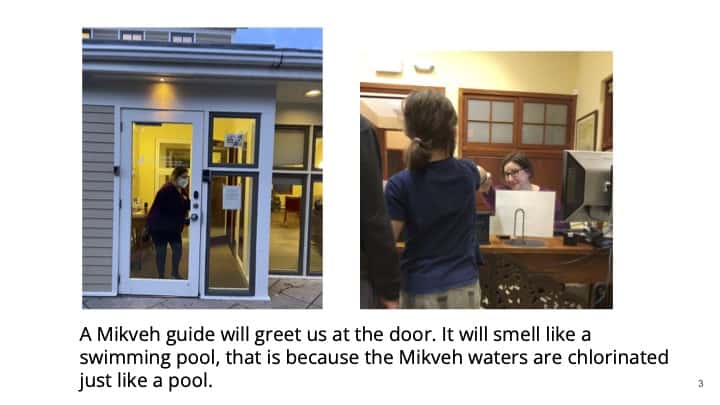
People use the mikveh to celebrate joyous occasions like birthdays or coming out; to find solace and healing after loss, illness or trauma; prepare for surgeries or mark mental health or fertility journeys; and to get ready for holidays and lifecycle events like b’mitzvah, weddings, creating a family and more.
One of its seven principles is “Petichut: Openness & Inclusivity,” and Mayyim Hayyim has many tools and resources to support the full inclusion of its Jewish community. But, until now, it didn’t have social stories to cover the full experience of visiting the mikveh for guests with disabilities. These stories explain the sensory and practical steps of first immersions.
During their first visit to the mikveh, Kesher kids and teachers got a tour and introduction to its place in Jewish tradition and the modern events that Jewish people mark with immersion. Then, each of Kesher’s Judaics classes was given a different lifecycle event to contemplate. Kindergarten and first grade looked at baby-naming. Second and third graders studied weddings. Fourth and fifth graders focused on conversion. Middle school students chose events that affected them as adolescents, such as turning 18, dealing with the death of a loved one and managing social anxiety.
Teachers also brought examples of social stories for the children to examine, like “My First Swimming Lesson,” “My First Haircut” and “What’s the Difference Between Chanukah and Birthday Candles.” Some classes read a book about going to the doctor and a social story about the same topic to understand how fiction is different from a social story.
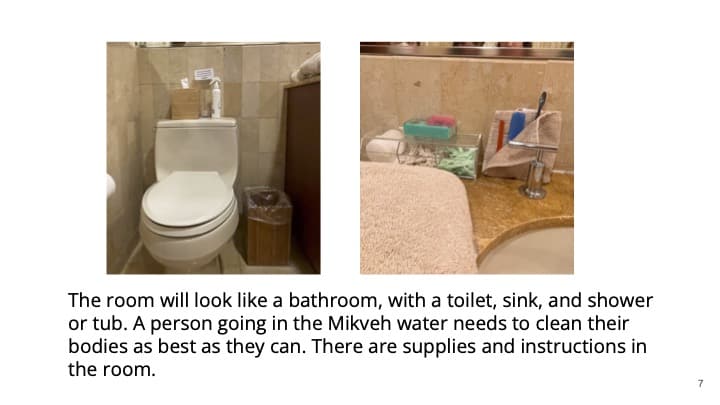
Finally, kids decided which photographs would enhance their books and returned to the mikveh to snap them. They wrote the text, received edits like true professionals and, finally, put the stories together on slides. Kids then presented their stories to the Mayyim Hayyim staff and their parents at the mikveh in January.
“The building was full of energy as the kids took over the space, showing their parents all the special corners of the building. Their excitement told us how deeply the children now feel connected to this space as one of their own Jewish homes. As such, we now have a responsibility to nourish this connection and ensure the kids and their families continue to feel at home here at their community mikveh,” says Soreh Ruffman, Mayyim Hayyim’s program director for immersions and education.
Now, the stories are available at the mikveh, sent to guests ahead of their appointments and shared with volunteer guides to ensure they’re familiar with the resources when people arrive.
“The feedback has been astoundingly positive. Everyone has been amazed by the work and found the resources to be incredibly helpful in preparing for their visits to the mikveh,” Ruffman says.
